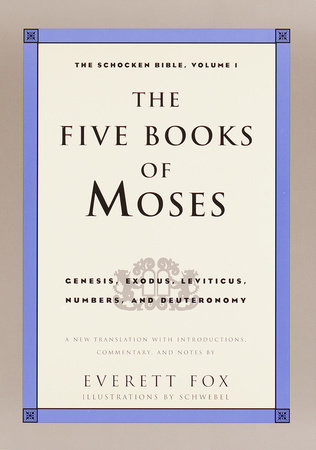This translation is a stunning achievement--to read it is to hear the Bible as if for the first time. While other English translations of the Bible render its language as if it had been written in English, this new translation re-creates the full force of the Bible's original rhetoric and poetry--its rhythms, nuances, and stylistic devices--allowing the English reader to experience the spiritual and aesthetic power of the Bible's own voice while recovering layers of meaning that are missed entirely in conventional translations.
Everett Fox has devoted twenty-five years to this unique approach to Bible translation. Based on principles developed by Martin Buber and Franz Rosenzweig, this new English translation restores the poetics of the Hebrew original--the echoes, allusions, alliterations, and word-plays that rhetorically underscore its meaning and are intrinsic to a text meant to be read aloud and heard.
Widely praised by Bible scholars and theologians of every denomination, the publication of the first volume of The Schocken Bible is a major religious, scholarly, and literary event. Together with its extensive commentary and illuminating notes, this unique translation draws the reader closer to the authentic living voice of the Bible.
A teacher's guide is available for this title. Please click on "teacher's guides" above.
PRAISE FROM EDUCATORS FOR Five Books of Moses:
"A powerful new translation that will challenge the reader to make an important effort to grasp and understand, but which will reward any reader with new appreciation, insights, and comprehension of the original. It is the next best thing to reading and understanding the original itself."
--David Noel Freedman, Professor of Hebrew Biblical Studies, University of California, San Diego
"Fox's work is...a real breakthrough in the English translation of the Bible.... Both in its rendering of the original Hebrew and in its insightful notes and discussions, it opens up the Biblical text--its language and thought patterns--in new and refreshing ways."
--Peter Machinist, Hancock Professor of Hebrew and Other Oriental Languages, Harvard University
"A splendid achievement. The clarity and simplicity of the English capture the artistic and religious dimensions of the Hebrew. The translation enables readers to experience scripture as an enduring treasure forever new."
--Phyllis Trible, Baldwin Professor of Sacred Literature, Union Theological Seminary
"This translation preserves the idiosyncrasies of the unique time and place in which [the Hebrew] was first spoken. But, at the same time, it gives the Hebrew text a straightforward, human voice that makes it available to those of us who wish to understand it in the context of other times and places--our own, to begin with, and, for historians of religions, those of other religions. This is a stunning achievement."
--Wendy Doniger, Mircea Eliade Professor of the History of Religions, University of Chicago
"This book is unique in the long history of the rendering of the Bible into English. Less a translation than an imitation of the Hebrew, it provides the anglophone reader an unparalleled access to the rhythms and wordplays of the original. No serious Bible reader--whether Jewish, Christian, or secular--can afford to ignore this volume."
--Jon D. Levinson, Albert A. List Professor of Jewish Studies, Harvard Divinity School
"Readers unfamiliar with Hebrew will find here a whole new perspective, bringing out the word-plays, stylistic repetitions, and oral character of the text in ways that have been impossible with conventional translations."
--Robert McAfee Brown, Professor Emeritus of Theology and Ethics, Pacific School of Religion
"Fox's translation has the rare virtue of making constantly visible in English the distinctive Hebraic quality of the original, challenging preconceptions of what the Bible is really like. A bracing protest against the bland modernity of all the recent English versions of the Bible."
--Robert Alter, Professor of Comparative Literature, University of California, Berkeley
"Everett Fox's new translation of the Old Testament must be one of the most important books. For once since the King James, a translation that comes right out of the heart of the living culture of the thing. I read it with real excitement, like a wholly new real text."
--Ted Hughes, British Poet Laureate
EXCERPT:
In the story of the Burning Bush, God charges Moses to bring the Israelites
out of their slavery in Egypt.
Now Moshe was shepherding the flock of Yitro his father-in-law, priest of Midyan.
He led the flock behind the wilderness--
and he came to the mountain of God, to Horev.
And YHWH's messenger was seen by him
in the flame of a fire out of the midst of a bush.
He saw:
here, the bush is burning with fire,
and the bush is not consumed!
Moshe said:
Now let me turn aside
that I may see this great sight--
why the bush does not burn up!
When YHWH saw that he had turned aside to see,
God called to him out of the midst of the bush,
he said:
Moshe! Moshe!
He said:
Here I am.
He said:
Do not come near to here,
put off your sandal from your foot,
for the place on which you stand--it is holy ground!
And he said:
I am the God of your father,
the God of Avraham,
the God of Yitzhak,
and the God of Yaakov.
Moshe concealed his face,
for he was afraid to gaze upon God.
Now YHWH said:
I have seen, yes, seen the affliction of my people that is in Egypt, their
cry have I heard in the face of their slave-drivers;
indeed, I have known their sufferings!
So I have come down
to rescue it from the hand of Egypt,
to bring it up from that land
to a land, goodly and spacious,
to a land flowing with milk and honey,
to the place of the Canaanite and the Hittite,
of the Amorite and the Perizzite,
of the Hivvite and the Yevusite.
So now,
here, the cry of the Children of Israel has come to me,
and I have also seen the oppression with which the Egyptians
oppress them.
So now, go,
for I send you to Pharaoh--
bring my people, the Children of Israel, out of
Egypt!
(Use of this excerpt from Five Books of Moses, Deluxe Edition with Illustrations by Everett Fox may be made online only for purposes of promoting the book, with no changes, editing, or additions whatsoever, and must be accompanied by the following copyright notice: Copyright© 1996 by Everett Fox. All rights reserved.)





